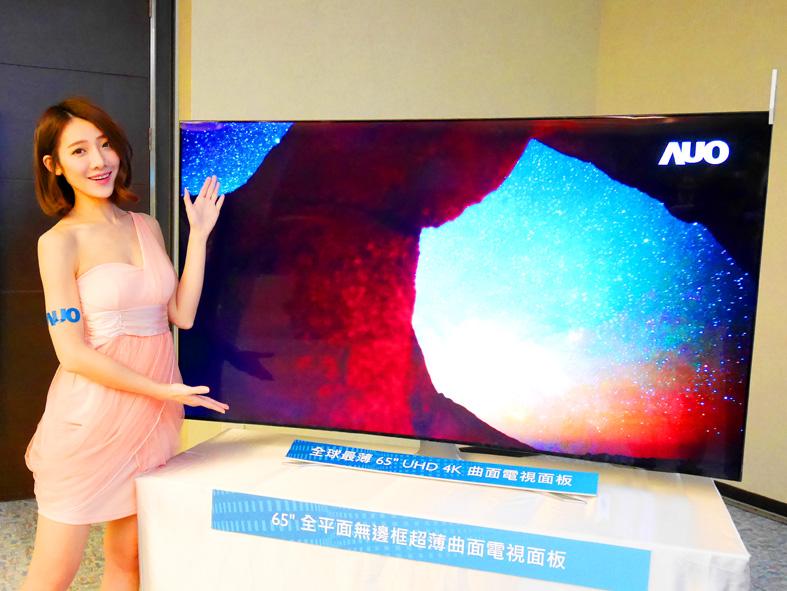Taiwan’s flat-panel industry has emerged from the doldrums thanks to a COVID-19-related surge in demand, the Ministry of Economic Affairs said yesterday.
Production value in the industry last year grew 0.3 percent from 2019, ending two years of declines, the ministry said in a statement.
The local flat-panel industry was affected by oversupply due to Chinese competition in 2018 and 2019, with its production value dropping 16.9 percent annually to NT$725.4 billion (US$25.47 billion at the current exchange rate) in 2019, a 14-year low, ministry data showed.

Photo: Chen Mei-ying, Taipei Times
However, the boom last year due to demand for information and communications technology (ICT) products amid work-from-home and distance-learning trends caused the flat-panel market to recover, the ministry said.
In addition, the local industry’s production value grew 11.2 percent year-on-year in the second half of last year, the largest increase for the period since 2013, it said.
Panels larger than 10 inches provided most of the growth last year, the ministry said.
They accounted for 58.3 percent of total sales and generated production value of NT$424.2 billion, up 4.6 percent from a year earlier, it said.
However, small and medium-sized panels suffered amid a slowdown in the cellphone panel market and US sanctions on Chinese tech firms, with production value decreasing 12.5 percent year-on-year, it said.
China, including Hong Kong, remained the largest shipment destination for Taiwanese flat panels last year, with exports totaling NT$6.92 billion, up 5.3 percent year-on-year, the ministry said.
Exports of flat panels increased 5.3 percent from 2019, while Chinese panel exports contracted 4.7 percent, South Korea’s dropped 5.6 percent and Japan’s fell 6.2 percent, the data showed.
“It is a sign that Taiwanese manufacturers are keen to return and invest in Taiwan,” Department of Statistics Deputy Director-General Huang Wei-jie (黃偉傑) said.
“They are laying the groundwork to manufacture for automotive, medical, e-sports and other higher-value products, which is a positive development for the Taiwanese panel industry,” Huang said.

South Korea’s equity benchmark yesterday crossed a new milestone just a month after surpassing the once-unthinkable 5,000 mark as surging global memory demand powers the country’s biggest chipmakers. The KOSPI advanced as much as 2.6 percent to a record 6,123, with Samsung Electronics Co and SK Hynix Inc each gaining more than 2 percent. With the benchmark now up 45 percent this year, South Korea’s stock market capitalization has also moved past France’s, following last month’s overtaking of Germany’s. Long overlooked by foreign funds, despite being undervalued, South Korean stocks have now emerged as clear winners in the global market. The so-called “artificial intelligence

Chinese artificial intelligence (AI) start-up DeepSeek’s (深度求索) latest AI model, set to be released as soon as next week, was trained on Nvidia Corp’s most advanced AI chip, the Blackwell, a senior official of US President Donald Trump’s administration said on Monday, in what could represent a violation of US export controls. The US believes DeepSeek will remove the technical indicators that might reveal its use of American AI chips, the official said, adding that the Blackwells are likely clustered at its data center in Inner Mongolia, an autonomous region of China. The person declined to say how the US government received

‘SEISMIC SHIFT’: The researcher forecast there would be about 1.1 billion mobile shipments this year, down from 1.26 billion the prior year and erasing years of gains The global smartphone market is expected to contract 12.9 percent this year due to the unprecedented memorychip shortage, marking “a crisis like no other,” researcher International Data Corp (IDC) said. The new forecast, a dramatic revision down from earlier estimates, gives the latest accounting of the ongoing memory crunch that is affecting every corner of the electronics industry. The demand for advanced memory to power artificial intelligence (AI) tasks has drained global supply until well into next year and jeopardizes the business model of many smartphone makers. IDC forecast about 1.1 billion mobile shipments this year, down from 1.26 billion the prior

FORTUNES REVERSED: The new 15 percent levies left countries with a 10 percent tariff worse off and stripped away the advantage of those with a 15 percent rate In a swift reversal of fortunes, countries that had been hardest hit by US President Donald Trump’s tariffs have emerged as the biggest winners from the US Supreme Court’s decision to strike down his emergency levies. China, India and Brazil are among those now seeing lower tariff rates for shipments to the US after the court ruled Trump’s use of the International Emergency Economic Powers Act to impose duties was illegal. While Trump subsequently announced plans for a 15 percent global rate, Bloomberg Economics said that would mean an average effective tariff rate of about 12 percent — the lowest since